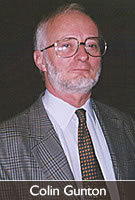Colin E. Gunton
Website
Genre

|
The One, the Three and the Many: God, Creation, and the Culture of Modernity
—
published
1993
—
7 editions
|
|

|
The Triune Creator: A Historical and Systematic Study
—
published
1998
—
6 editions
|
|

|
The Promise of Trinitarian Theology
—
published
1991
—
8 editions
|
|

|
The Christian Faith
—
published
2001
—
6 editions
|
|

|
The Cambridge Companion to Christian Doctrine
—
published
1993
—
10 editions
|
|

|
Act and Being: Towards a Theology of the Divine Attributes
—
published
2002
—
7 editions
|
|

|
The Actuality of Atonement: A Study of Metaphor, Rationality and the Christian Tradition
—
published
1989
—
10 editions
|
|

|
Christ and Creation: The Didsbury Lectures, 1990
—
published
1969
—
7 editions
|
|

|
A Brief Theology of Revelation
—
published
1995
—
7 editions
|
|

|
Trinity, Time, and Church: A Response to the Theology of Robert W. Jenson
—
published
2000
—
5 editions
|
|
“In our desire to impose form on the world and our lives we have lost the capacity to see the form that is already there; and in that lies not liberation but alienation, the cutting off of things as they really are.”
―
―
“For theologians groaning under the oppression of demands to justify their discipline before the bar of what is supposed to be universally valid scientific method the appeal of non-foundationalism is immense. It liberates a celebration of the rights of particularity. It enables the theologian to say that theological method must be different from other methods because it shapes its approach from the distinctive content with which it has to do - just as, indeed, other disciplines shape their approaches in the light of their distinctive content. Non-foundationalism, that is to say, is a way of advocating the autonomy of distinct intellectual disciplines.”
― The One, the Three and the Many: God, Creation, and the Culture of Modernity
― The One, the Three and the Many: God, Creation, and the Culture of Modernity
“[W]e, being who and what we are, cannot know unless we are taught by that which is other than we, and that means by the Spirit of God, albeit in diverse mediations. Though nature is relatively passive under our enquiry… it remains true that knowledge of her comes as fit, and is therefore a species of revelation…. If there is revelation of the truth of the world, it is because the Spirit of truth enables it to take place. To put it another way, the creator Spirit brings it about that human rationality is able, within the limits set to it, to encompass the truth of creation. We therefore neither control nor create our knowledge, even though the concepts by which we express it are in part the free creations of our minds. Does it not then follow that all knowledge depends on disclosure or revelation?”
― A Brief Theology of Revelation
― A Brief Theology of Revelation
Is this you? Let us know. If not, help out and invite Colin to Goodreads.

















